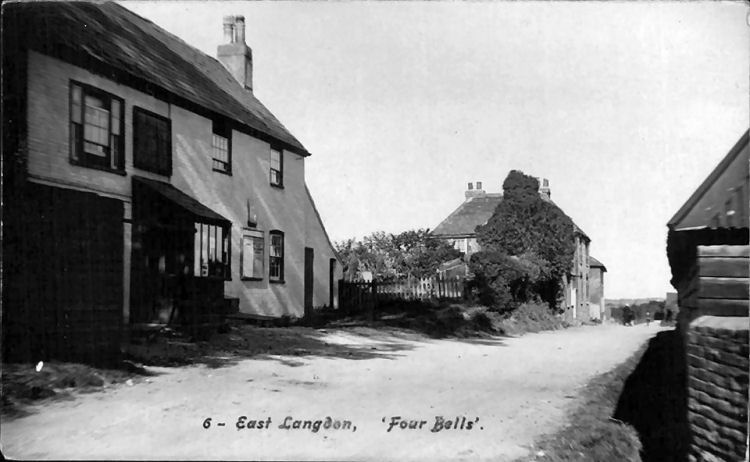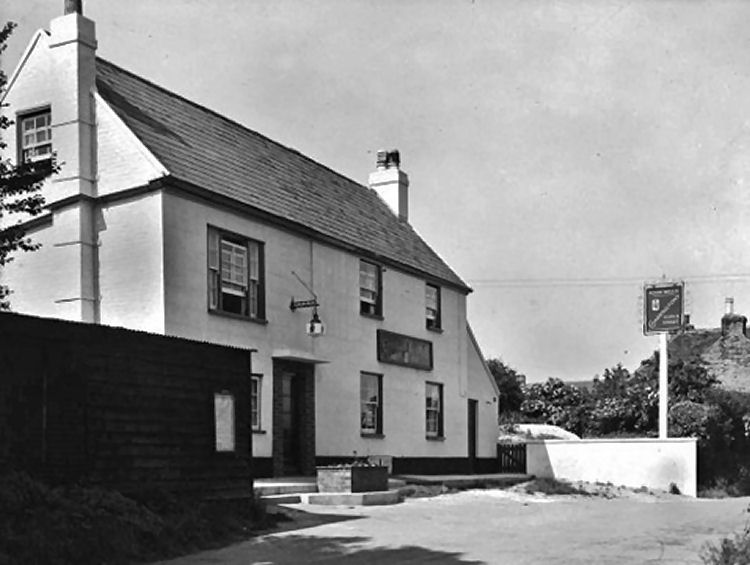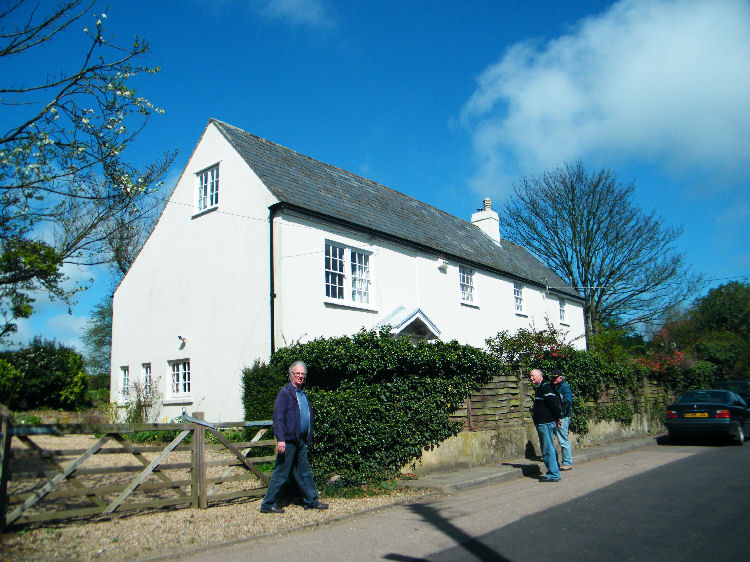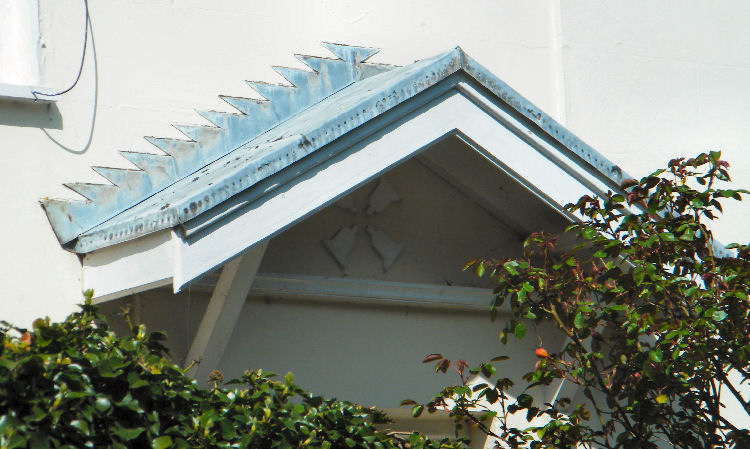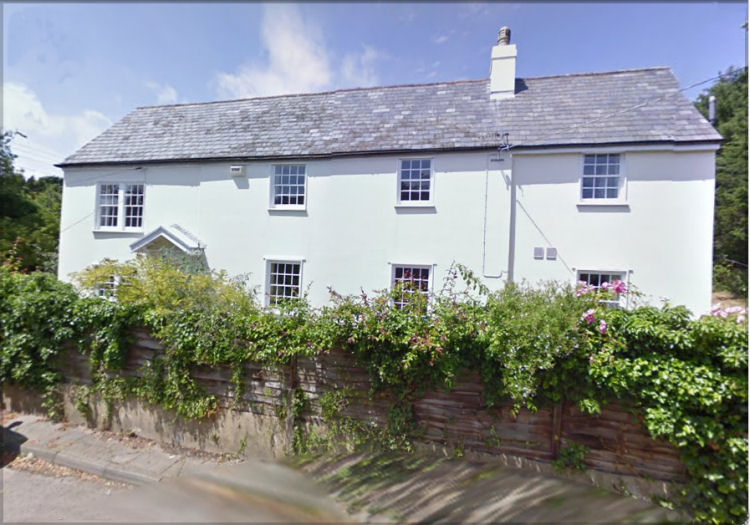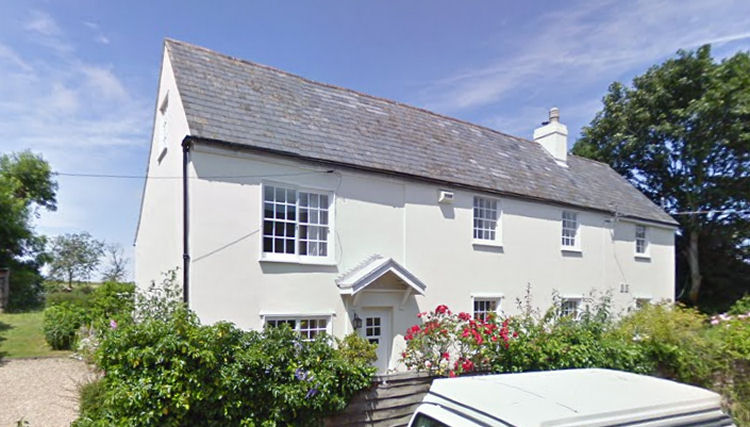|
From the Dover Express and East Kent News, 19 October, 1923.
CHARGES AGAINST LANDLORD AND TEN MEN.
LICENSING LAWS SET AT DEFIANCE.
At the Dover County Petty Sessions yesterday, Thomas Walker, landlord of
the "Four Bells," East Langdon, was charged with supplying liquor during
prohibited hours. P. Collard, H Waller, E. Waller, J. Higgins, A. G.
Upton, A. Marsh, G. Hobbs, J. Graves, J. Harris and H. Oliver were
charged with consuming.
Mr. A. K. Mowll Appeared on behalf of Walker, Graves and Oliver.
All the defendants pleaded not guilty except Higgins, who said that he
was guilty, but he thought there was an extension.
Police Sergt. Beasley, stationed at Walmer, said:- About 5 p.m. on
September 21st I was in plain clothes, in company with P.C.'s Cocks und
Hughes, near tho "Four Bells" public-house, East Langdon. We saw four
men enter by, way of the back door. Cox and I followed. We tried the
door, and found it locked. I knocked at the door which was opened by
Walker, who said, "Be careful. There are strangers about," and locked
the door again. We then entered the cellar, wherein we saw six men
standing. The landlady was kneeling on one knee, filling five pint
glasses with beer, which she placed on a tray. At the same time her
daughter Hilda came to her and asked her to change a 2s. piece. I said
to the daughter, "Is that money for beer?" and she replied "Yes." I then
informed her that we were police officers. We went to Walkers living
room, where P.C. Hughes had entered by another door, where we saw he
following men:— P. Collard, H. Waller, E. Waller, J. Higgins, A. G.
Upton, A. Marsh, G .Hobbs, J. Graves, J. Harris and E. Oliver. These men
had five pint glasses and four half-pint glasses, containing beer, and a
glass of whisky, all of which had been partly consumed, and was in front
of them. As we entered the room I saw H. Waller and G. Hobbs drinking. I
asked who had served them, and they said they had purchased the liquor
from the landlady. Upton said that he had purchased his from the
landlady. I took a sample of the beer. I then said to the landlord, "I
want you to take particular notice that these nine glasses contain beer,
and this one whisky." Ho replied, "That is right. I have been to the
farm sale all day. I have not served it." Hilda Walker, the landlady,
said, "I have not served the drinks. You have a good case. It is a pity
you have not something better to do." Hilda Walker said, "I have been
serving beer all the afternoon, but not in this room." I said to Thomas
Walker, the licensee, "I shall report you." I also told the ten men that
I should report them. The opening hours were from 10.30 a.m. to 2.30
p.m., and from 6 to 10 p.m. The bulk of the men went down the road a
quarter of an hour before.
Mr. Mowll:- You must have been disguised (laughter).
Well, I was in plain clothes.
Cross-examined. It was usual to have an extension when farm sales were
on, and it was quite possible that some of the defendants thought there
was an extension.
Did you sample the beer?
We smelt it (laughter).
On being pressed, witness maintained that the defendant was present, but
no one had a drink whilst he was there.
Cross-examined by Collard, witness denied that Collard said anything to
him when he took his name and address.
Waller:- You say you saw me with a drink in my hand!
Yes.
You're a liar!
The Magistrates' Clerk:- That is a statement; not a question.
Did I tell you I had gone inside to get a pen and ink to sign a cheque!
No; you said nothing.
Another defendant:- Did I say anything to you!
No.
Well, how did you know my name, then? (laughter).
P.C. Cocks, K.C.C., of Great Mongeham, said he was with Sergt. Beasley
and P.C. Hughes. He continued the evidence given by the previous
witness.
Cross-examined! He took seven defendants names, and they were correct.
When he served the summons on Graves, he did not deny having any beer.
Higgins and Upton admitted having the beer in front of them. All the
others, except Waller and Hobbs, who he saw drinking, would not admit
that the drinks were theirs.
P.C. Hughes, K.C.C., of East Langdon, said he went into the public-house
about a minute after the two previous witnesses. He was admitted by the
landlady, who said "This is a fine state of affairs. It is all my fault.
What can I say. I have been serving all the afternoon, and we have got
caught at last." He went into the room and saw the ten defendants with
five pints, four half-pints and a whisky, in front of them. He saw
Waller and Hobbs drinking.
Cross-examined. All three went to the sale in plain clothes. A public
house was open all day for minerals.
By the Chairman. They were at the sale "not on duty."
Supt. Barton:- You were not detailed to watch this house?
No; we thought there were things going on which should not be.
In reply to Collard, all those present had their names taken.
Waller:- You came in a minute afterwards. Do you think I should have a
glass up to my lips for a minute?
You might have kept it there longer.
Hobbs:- The police officers were half way round the room before you
came.
Walker said he had been licensee there for 2 1/2 years, and had a wife
who was a bit of an invalid and his daughter was a pupil teacher at the
Convent. On this day he went to the sale at Mr. Millen's farm, about
three minutes' walk, and did not get back until 4.45. He washed his
hands and then, in response to the knocking, admitted the two policemen.
He did not see his wife serving beer, or was he aware anyone was
drinking in the place. If he had known he would have stopped it. The
police knew before he did.
Supt, Barton:- There is no question that the beer was supplied!
I did not see any.
Further examined, Hobbs was his guest. He did not deny there was beer in
the glasses or the question of the number of glasses. His wife or
daughter would serve in his absence.
Hezekiah Oliver, "Butcher’s Arms," Ashley, said he had been licensee for
seven years. He went in about 4.30 for some cigarettes. He had no beer,
and when the constable said, "Where’s your beer?" he said "I haven’t
any."
Cross examined, he was in the room, but he could not say whose glasses
were on the table. He wasn’t in the house two minutes when the police
arrived.
James Graves, Ashley, said he was with Oliver at the sale. He went in
for "a bit of bread and cheese and a packet of fags." He told the
policeman he had had no beer or anything to drink, and neither did he.
Supt. Barton:- You only had some bread and cheese. Were you going to
have anything with it?
I didn't have time (laughter).
Percy Collard, licensee of the "Marquis of Granby" Alkham, said that he
drove to the sale and borrowed a halter from Mrs. Walker. After the sale
was over he put his horse in the trap and took the halter back and paid
for the stabling. Whilst doing so, in the room where the others were,
the sergeant came in and took his name and address. He asked witness
"What have you in front of you?" and he said "Nothing." Witness had not
been in the house two minutes. Mr. Robinson, his friend, was with him in
the room.
Cross-examined. He did not drink beer, but whisky.
Do you know who the whisky belonged to?
Yes; a man who has pleaded guilty.
Charles Alfred Robinson, of Alkham, a retired Army officer, said that
he went into the "Four Bells" with Mr. Collard, when the police came in.
They did not take witness’s name and address. He was next to the
defendant, and he did not have any drink.
Cross-examined. He was not one of those who were in the cellar.
The defendants were invited to make any statement they wished to the
Bench.
George Hobbs, of Langdon Abbey, a merchant seaman, said he was on leave
and went to the sale. He was invited to dinner and tea at the
public-house, and had only just got there to tea when the police
arrived. He never had any drink.
Cross-examined. The policemen who said he was drinking from a pint glass
were not speaking the truth.
None of the other defendants had anything else to say.
Mr. Mowll addressed the Bench, and said that they would understand the
difficulty of two defensiveless persons when they saw the array of
people there that day charged with consuming liquor. At these farm sales
it was usual, to enable the licensee nearest the sale to make a little
extra, to grant an occasional licence or an extension of hours, so that
those disappointed at not getting what they were after or who were happy
at having struck a bargain should have a little opportunity of
refreshing themselves. The duty of the licensee was to keep his house
open, and one could understand these people going there, expecting to be
able to get a drink. It was nil right if the licensee was at home. He
could say, "We cannot serve you." But when these people got inside they
found only the invalid wife and her daughter, what could they do? They
could not take them by the scruff of their necks and the seat of their
trousers and throw them out. The citadel had to fall (laughter). If it
had not, these people would have gone and helped themselves to the beer.
He suggested that if the Bench convicted the licensee, it would be a
very great hardship for an offence he was not morally responsible for.
The Bench were absent some time considering the case, and, on return,
the Chairman said that they had given careful consideration of the
matter and had come to the conclusion that, as far as the licensee was
concerned, he must be fined. They were not saying anything in regard to
the proprietary or otherwise of the Act of Parliament in its present
condition. They bore in mind the fact that there had beeu extensions at
farm sales, and it was a difficult thing for licensees to carry on their
business, but they, as well as the police and the Bench, had a duty to
perform. Walker would be fined the mitigated penalty of 20s. Against
Percy Collard, James Graves and Hezekiah Oliver there was not sufficient
evidence to warrant conviction, and those cases would be dismissed. In
all the other cases there would be fines of 5s. each.
Walker:- I would have been more careful, but I had been in hospital
three months.
The Chairman:- What do you want to say?
The defendant:- I think I might have got off (laughter).
|
